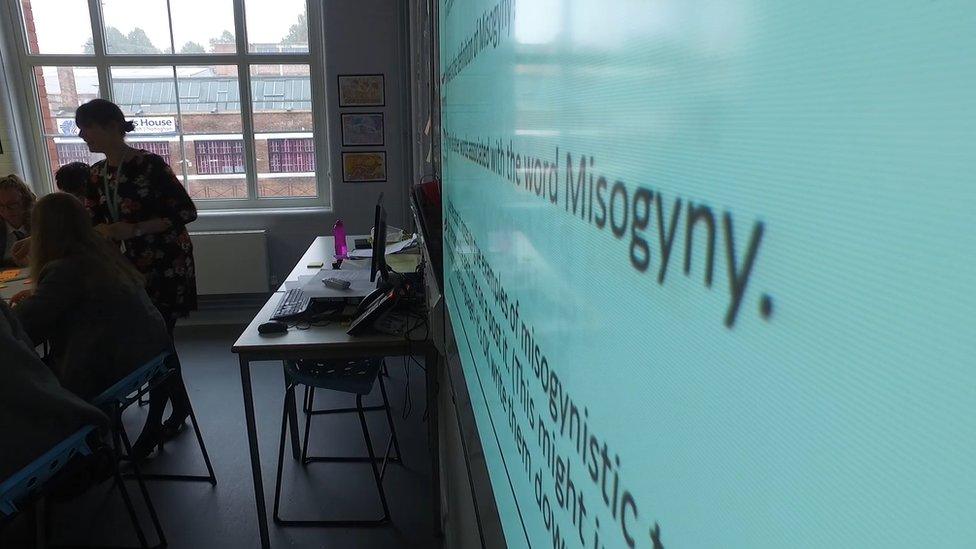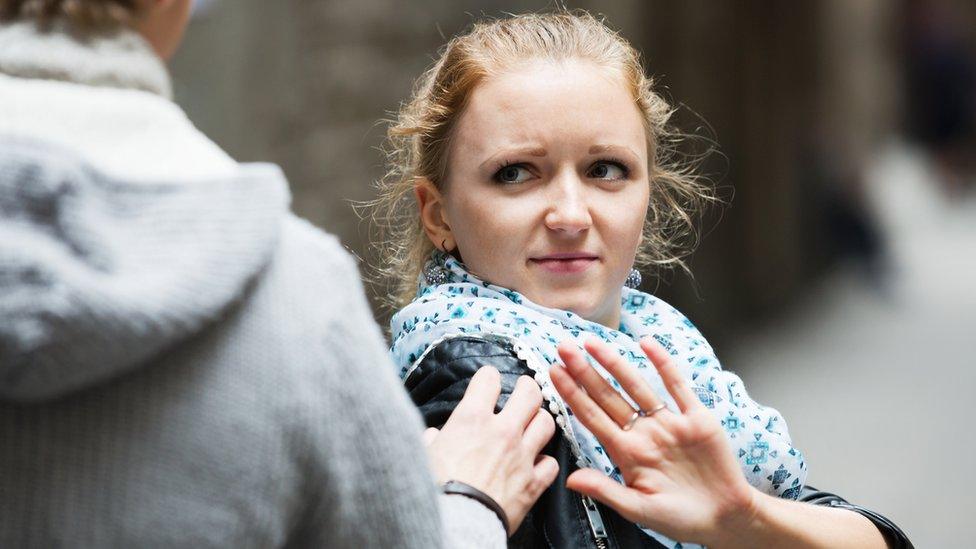School teaches pupils about impact of sexist language
- Published
Sexist language 'part of everyday life'
"I hear it so often now it just doesn't actually bother me, It's just part of everyday life, just a normal word."
That is the view of a teenage boy at Nottingham Free School, who is among a group of pupils being taught in special lessons about the impact of verbal abuse against women.
The school was so worried about the amount of misogynistic language to which its pupils were exposed, it decided to tackle the issue head on.
BBC 5 live was given exclusive access to speak to the young people, with permission from parents and teachers.
The students were asked to write down examples of the sort of language they'd heard or seen which might be misogynistic or prejudiced against women - some is reproduced here and may be offensive to some readers.
A 14-year-old boy says the words are regularly used amongst teenagers, "(to) insult your mates, whether that be a joke, or insulting someone, as if you meant to hurt their feelings. It's so commonly used you don't think about what the consequences might be".
He adds: "I've called my mates a bitch before. I've also used the word slag before."
A teenage girl says: "Boys usually use phrases like 'like a girl' or 'get back in the kitchen' but then I feel girls use bitch and whore and slag and sket towards each other."
'Shocked'
The teacher in charge of the lesson, Severine Wilken, asks pupils to write down all the words and phrases they have come across. It's a long and depressing list of verbal abuse.
A board in the classroom is covered with sticky notes featuring phrases such as "feminazi" and "runs like a girl", as well as more sexually offensive words.
"I was shocked by the amount that they are clearly bombarded with," says Ms Wilken. "I was pretty shocked when I researched the lesson and discovered how much misogyny is in our day-to-day life, in popular culture that children are obviously listening to."
The school's head, Jenny Brown, says social media and the online world are compounding the problem.
"There are no boundaries online. No check, social norms don't apply," she said. "I think teenagers see it as a secret world so they feel safe to do things there they would never do in real life. They behave differently, and that's the thing that adults don't understand."

The school started the lessons because of the language to which the students are exposed
After getting pupils to write down the language they've come across, they're asked to discuss the impact it can have.
For some of the girls in the class it's significant.
"It belittles you as a girl. You feel really self-conscious and you get anxious," says one. "There have been times I didn't want to leave the house, I didn't want to talk to people because I was anxious or I was worried about what people would say."
Her classmate adds: "It's not nice being on the receiving end. It makes me feel angry and almost embarrassed to be a girl because it makes me feel really low and small compared to boys."

Pupils are learning what the word misogyny means and the impact it can have
The class does seem to be making an impression, the boys say it has made them think again about how they use language, and the impact it has.
"When you're saying it… you never think about what the consequences could be from what you've said. So now that you have an insight in what it makes other people feel like, it makes me less likely to use it," said one boy.
Ms Wilken feels other schools need to follow their lead, saying: "We're only educating a very small part of the Nottingham population, so pupils feel open enough to discuss a range of issues, but in particular also the girls feel confident to say 'you know what, actually that's offended me.'
"That's where it's going to start, not just us sitting back and letting things happen. When I did the research, it was amazing how many women actually do just get on with it, because, that's life, and it shouldn't be that way."
You can hear more about this story on BBC 5 live Breakfast on Monday 15 January between 06:00 and 0:900 GMT and on iPlayer Radio afterwards.
- Published20 October 2015

- Published13 July 2016
